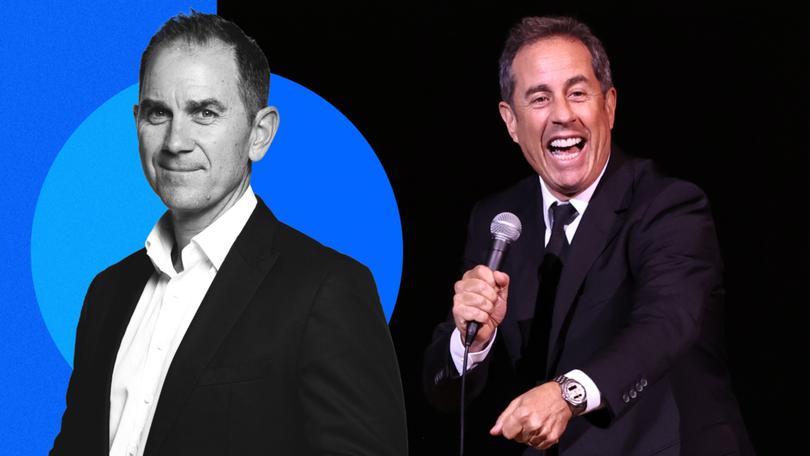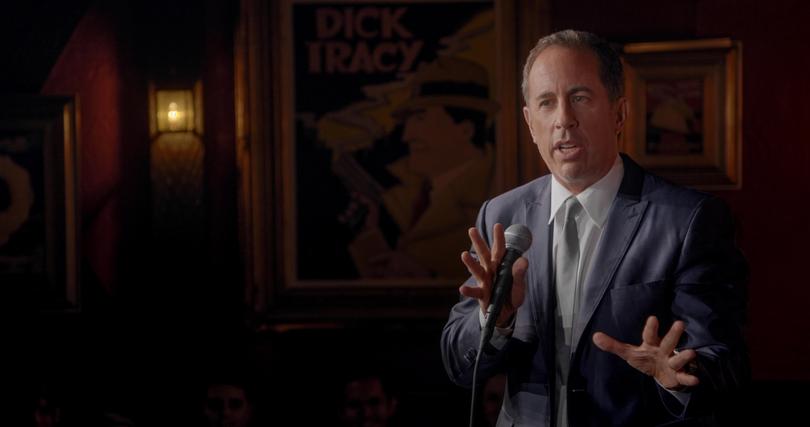JUSTIN LANGER: Risk-takers like Jerry Seinfeld, Elon Musk and Richard Branson get rewarded for bold moves
JUSTIN LANGER: The pictures the global comedic star uses to inspire him should inspire us all to overcome our fears.

Sitting around the firepit last Saturday night, glass of red wine in one hand, music playing in the background, I was overcome with a moment of melancholy.
To remedy the itch, I video-called my great mate James Brayshaw, who was sitting at home in Melbourne watching the footy.
“You are not going to believe this buddy, but tomorrow night Gracie (my youngest daughter) is getting on a plane and flying to Greece. Can you believe that?”
Sign up to The Nightly's newsletters.
Get the first look at the digital newspaper, curated daily stories and breaking headlines delivered to your inbox.
By continuing you agree to our Terms and Privacy Policy.The reason I rang James about this ‘dad dilemma’, was that he and I flew to the Greek Islands together 35 years ago, when we were the same age as Gracie.
Reminiscing about our holiday in Santorini and Ios, we laughed about the memories and some of the sticky moments of disorganisation that come with teenage ignorance.
Daft as we were, I wouldn’t change that experience for anything, because not only was a lifelong friendship forged, but the beauty of Greece and her treasures form part of the tapestry of my life.
My Saturday night moment of contemplation, was nothing any parent hasn’t been through before.
Much as we want to protect our kids, we also know that we have to do a lot of letting go to allow them to live their best life — and learn through good and bad.
If my parents didn’t say it to me, I’m certain they would have thought many times: “You just wait until you become a dad, then you will see how it really feels.” Sound familiar?
Riding a bike, or swimming for the first time, going to school, learning to drive, leaving home, breaking up, first hangover, performing in public, travelling on a plane, and getting married are all important milestones; but when you are a parent of a child taking those things on, they can also be incredibly daunting as our protection mechanism kicks in.
Watching Gracie walking through the departure gates on Sunday night was heart-achingly traumatic on the one hand, but on the other, her smiling face (albeit with a few tears in her eyes), and happy waves, were a reminder of the journey of life; that without degrees of risk, it can be mundane and void of growth.
Leading to this airport moment of sadness and joy, I spent the week doing the Australian Institute of Company Directors Company Director’s Course. A phenomenal course, with mountains of learnings. One of the standout musings was shared by our facilitator Peter Fitzpatrick who was dealing with the concept of risk and strategy.
Early in the morning session, Peter gave us a sheet of paper with a poem on it called Risk by William Arthur Ward:
To laugh is to risk appearing a fool,
To weep is to risk appearing sentimental, To reach out to another is to risk involvement, To expose feelings is to risk exposing your true self, To place your ideas and dreams before a crowd is to risk their loss, To love is to risk not being loved in return, To hope is to risk despair, To try is to risk failure.
But risks must be taken because the greatest hazard in life is to risk nothing.
The person who risks nothing, does nothing, has nothing, is nothing. He may avoid suffering and sorrow, But he cannot learn, feel, change, grow or live. Chained by his servitude he is a slave who has forfeited all freedom. Only a person who risks is free.
The pessimist complains about the wind; The optimist expects it to change; And the realist adjusts the sails.
There is a spectrum of course when it comes to risk and reward.
Elon Musk launched Space X to colonise Mars, while Richard Branson founded Virgin Galactic to commercialise space travel. Nelson Mandela fought apartheid knowing it could cost him his life. Ernest Shackleton led the Endurance Expedition to Antarctica. Some of the greatest risk takers in history are recognised as the most successful to have lived.
Others haven’t been so fortunate and their proclivity for peril has ended in bankruptcy, jail or worse.
In everyday life, some people would jump out of a plane for an adrenaline rush, while others surf big waves, climb mountains, travel to all parts of the world, or love driving fast on a racetrack.
Everyone’s penchant for risk varies, but any course of action where there is uncertainty of outcomes and results, either desirable or undesirable, or where you could succeed or fail, calls for a risk-reward response.
A gambler’s view on risk is higher than a person who is happy with their money in the bank. A performer’s risk is higher than those who are sitting in the stands or auditorium enjoying the show.
Where you stand on the spectrum is entirely a personal choice.
One of the world’s great comedians, Jerry Seinfeld, was in Perth last weekend. Unsurprisingly, friends tell me he was phenomenal on stage.
Interestingly, the global superstar, who has taken his fair share of risks in his life, has a strategy for dealing with risk and stress, and the nerves associated with these decisions. Through my journey I have often used Seinfeld’s advice.
In his writing room, Seinfeld, has photographs of space taken by the Hubble Space Telescope. These photographs remind him of how insignificant we really are in the big scheme of things.
“When I tell people this, they often say the photos, ‘make me feel insignificant.’ But I don’t find being insignificant depressing. I find it uplifting,” he said.
In his case, the stress and anxiety caused by both his own and the public’s expectations of him — and the sheer pressure of his job as a stand-up comedian — could be suffocating.

But as he describes it: “When I realise I am only a speck on Earth, which is itself a speck in the universe, I feel empowered to take risks and create shows and routines that make me happy.”
In my case, when I jump on a plane, faced the world’s fastest bowler’s, endured the harshest of critics, stood on a stage, or did my best as a parent or friend, I have used a simple strategy for handling the risk of everything I do.
Let’s face it, whenever we are confronted by a question of being stretched, or taking a risk, the list of what if questions can be the length of your arm. For those with low-risk tolerance that list may be as deep as the ocean.
What if this happens? What if’ that happens? These are both natural questions to ask, but if you succumb to the negative options to each question, your chance of being bold and living a life of rich experiences and deep relationships will be limited and limiting.
My strategy has simply been to add the word so to the what if question.
What if someone steals my passport or wallet? Answer: So what, if someone steals it I will handle it and find a solution. More likely, the chances of this happening are also very, very slim, especially if I have them with me or locked in a safe.
What if I look like a fool on stage or I forget my lines? Answer: So what, I will learn from the experience, or I will adapt and get on with it. I will also be well prepared, so this is unlikely to happen.
What if I get hit by the ball and get hurt? Answer: So what, if I watch the ball carefully, I won’t get hit and if I do — as happened a few times in my career — I might be a bit sore, but I will be OK and there are great people around me to keep an eye on me. Practice and preparation will also mitigate these risks.
What if I get criticised? Answer: So what, it’s easy being a critic and I am the one doing it, having a crack, and loving the experience. Regardless of the critic, this is my life and I know criticism can be a part of the journey, but not enough to stop me from doing what makes me happy.
Risks are an important part of life.
We all have different degrees of tolerance to them and, while I am not an advocate for recklessness, I do believe in William Ward’s words that, “risks must be taken, because the greatest hazard in life is to risk nothing. The person who risks nothing, does nothing, has nothing, is nothing”.
